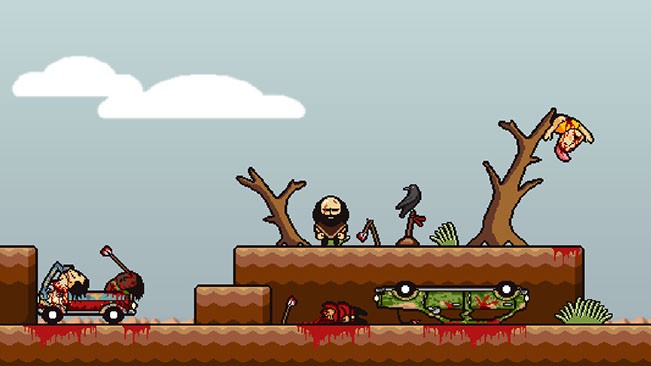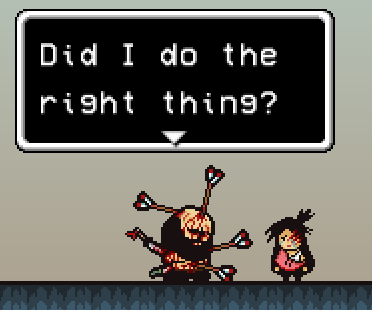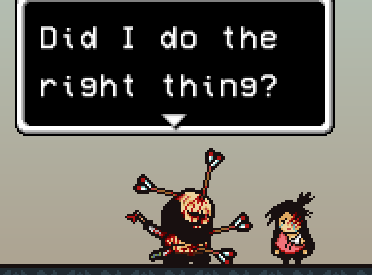It?s disclaimer is in the title. You don?t come across a title like ?Lisa: The Painful RPG? and think ?Wow, sounds like a fun game!? And fun it is not. In fact, Lisa is one of the most frustrating, depressing, and, you guessed it, painful games I have ever played. Yet it also changed the way I view games and the messages they harbor.
Tackling themes that are drastically underrepresented in video games, Lisa focuses on some of the worst and darkest parts of the human experience. Lisa takes the box labeled ?THE FAULTS OF SOCIETY? out of the attic, dusts it off, and displays its contents for all of its players to see.
Bolstering themes such as drug abuse, unbalanced/unhealthy power dynamics, greed, and manipulation, Lisa speaks volumes of our society and the politics involved in it. And to see it, all you have to do is dive right into the belly of one of the most painful RPGs you?ll ever play.
Background: What is Lisa and Why Should I Care?
Let me begin by saying, if you want an idea of the absolute morbidity and tone of Lisa, I highly recommend watching this official trailer:
Lisa trailer
Lisa tells the story of Brad Armstrong, a man living in a post-apocalyptic society plagued with one of the worst detriments imaginable: there are next to no women left on earth. And, to make matters worse, all remaining members of society have devolved into selfish liars, thieves, cheaters, perverts, and murderers who only look out for themselves. In short, society has fallen apart, and, at this point, it?s so far devolved that it looks like it probably isn?t even worth saving. Depressing, right?
 Brad
Brad
Our hero Brad stumbles across an abandoned baby girl in the desert one day, and decides that he must raise her and shield her from the dangerous men who would surely rape her and hold her captive. He names her Buddy.
One day, after Buddy has grown and appears to be flowering into an adult, she goes missing. The circumstances of her disappearance are unclear, though there?s a trail of blood and a body count in lieu of her presence. Certain that Buddy has been kidnapped, Brad embarks on a quest to save her. Throughout the game, he recruits, blackmails, and manipulates several characters to join his party, and often acts out of selfishness and with the sole intent of rescuing Buddy. From the beginning, it?s clear that even Brad hasn?t exactly escaped the rapid downfall of mankind.
Through Brad?s eyes and a whole lot of dark humor, the player experiences the horrors of this post-apocalyptic hell-scape and explores the boundaries of human nature. In so many ways, Lisa is a warning. It begs its player to steer clear of the destructive behaviors that, in Lisa, created a society that isn?t even worth saving.
 An image displaying the morbidity of Lisa
An image displaying the morbidity of Lisa
Drug Abuse
One of the most prevalent themes that Lisa employs to dissuade its players of destructive behaviors is that of drug abuse and addiction. The game establishes a world populated almost entirely by helpless drug addicts. We don?t know why and we don?t know how, but a highly addictive drug (which, quite ironically, is named ?Joy?) becomes the crutch of what remains of civilization. Joy does a lot of things ? it makes you stronger, it makes you feel invincible, it makes you a better warrior ? but it also gradually turns its abusers into hideous flesh monsters known as Joy Mutants that render them unrecognizable and completely strips them of all personality and sense of being.


 Joy Mutants
Joy Mutants
Several of Brad?s party members, including Brad himself, are helplessly addicted to Joy, and it is up to the player to either give them Joy or deprive them of it. If the player chooses to give the characters Joy, their performance in battle will improve tenfold, but the player is also consciously deciding to expedite the characters?s devolvement. Depriving them of Joy, however, causes mediocre performance in battle and makes a hard game even harder (this connects back to Lisa?s core theme of morality, which we?ll discuss more later on).
In this way, Lisa presents a commentary on the destructive nature of drug abuse and provides a visual caricature of what happens when drugs begin to take over someone?s life. As is shown by the characters beginning to slowly lose their sense of self, drugs are transformative and can completely change someone for the worse. It makes a strong argument against drug culture, convincing its player that drugs are destructive and that addiction can quickly replace personality.
In addition to this, by forcing the player to make the choice of whether or not to give their party members Joy, the game begs introspection of the player ? Is it wrong to give characters Joy if it furthers Brad?s mission? What are the benefits of using the illicit substance? How is the use of drugs in the game similar to the effects of drug abuse in real life? It allows the player to understand fundamental aspects of addiction and drug abuse without the player actually having to experience these things themselves.
Did I Do the Right Thing?
The theme of drug abuse (and its connected mechanics) is just one theme of many that contributes toward a much larger theme in Lisa ? the questions of what makes someone a better person than others, and what makes one choice more ethical than another.
SPOILER ALERT: SPOILERS BELOW!
These questions are evoked in a very tactical way. By forcing the player to choose between two terrible decisions (for example, killing off a party member or cutting off your own arm, or killing off all party members or watching as a man pins your daughter down and cuts off her nipple), the game throws into question what makes one choice worse than another. Who is to say which of these options is more humane or more ethical? Is it defined by our motivations? By our intentions? By our own code of ethics? How can we possibly examine these options from a wholly objective standpoint?
These questions culminate in one of the final scenes of the game, in which Brad finally finds Buddy after murdering hundreds of men, but she tells him that she ran away because she wants freedom, and that Brad is actually an awful person ? a murderer and a liar just like the rest. She leaves him to become a Joy Mutant, and to never find purpose in life again.

While our protagonist thought that he had been acting in righteousness on his hunt for Buddy, Buddy viewed the situation in the exact opposite way. What is the solution here? Who was right, Buddy or Brad? Who was behaving ethically, and who was in the wrong?
And the answer, as cliche as it is, is simply that there is no answer. There is no right or wrong. There is no better or worse. No one can say who is good and who is bad ? there is not a universal definition. Some decisions cannot be defined by their morality, as morality only exists in our minds. Every single decision we make is a double-edged sword, and a large part of being a ?good? person is figuring out how to account for and care about other people despite this.
So, Lisa is a pretty depressing game. It exposes us and picks apart so many of society?s flaws, displaying them for all of its player base to see. It may be painful to play, but, more than that, Lisa is painfully human and relatable. This encourages us to reflect, to call into question our code of ethics, and to ask ourselves ?What can I do so I don?t end up like Brad Armstrong??


